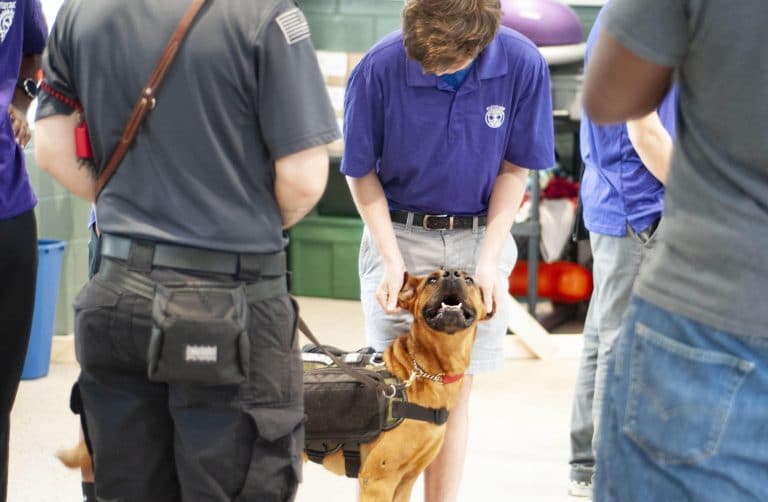
As a sufferer of post-traumatic stress disorder, U.S. Army veteran Debbie Richey left her house only rarely.
That changed with some constant canine companionship.
“I finally started to be able to go out in public. At first I was a little afraid. I wasn’t sure. I never had a dog before,” Richey said. “I started taking chances: I’m going to see if I can do this. And every time I did, she was right there with me.”
Navy — ironically named as a pup, considering Richey’s branch of service — went through two years of training with the Williston, Fla.-based nonprofit Guardian Angels Medical Service Dogs Inc. prior to being paired with her veteran.
“They handed me this leash and they said, ‘From this day going forward, you’re not going to be without this dog.’ And I couldn’t wrap my mind around that. How do you not go anywhere without a dog?” Richey recalled.
But the arrangement works:
“It made me happy with my kids. It made me a better mother, better wife.”
Richey and Marine Corps veteran Bill Jeffcoat served as guest speakers for the Plum Area Ladies Society, a service and social organization that met Feb. 1 at the Plum Community Center.
Jeffcoat, a Penn Hills native who lives in Plum, is president of Life Changing Service Dogs for Veterans, a Pittsburgh-area group that supports Guardian Angels.
“The dogs are trained to mitigate the visible and invisible disabilities that are facing our veterans,” he said, including conditions such as traumatic brain injury, seizure disorders, insulin dependence and mobility issues along with PTSD.
Readying each dog costs $25,000, he explained, “and they’re given to the veterans at no cost.”
His organization was formed in 2015 by veterans Tony Accamando and George D’Angelo, who had visited the Guardian Angels campus and decided to bring the cause north.
“At that time, the Veterans Administration was reporting that 22 veterans a day commit suicide,” Jeffcoat said, and in recognition of the statistic, Accamando and D’Angelo set a goal to “pair 22 veterans with 22 dogs in 22 months.”
They generated the necessary funding, plus quite a bit more.
“To date, we’ve raised $1.8 million. We’ve paired 30 veterans with 30 dogs. We have enough for 30 more,” Jeffcoat reported, with a caveat: “We’ve exceeded the capacity for Guardian Angels to train in Williston. There’s a waiting list of 300 veterans waiting for dogs.”
As a remedy, Guardian Angels has purchased 102 acres in Robinson Township, Washington County.
“The goal is to build a state-of-the-art, $25 million campus,” Jeffcoat said, “so that we can breed, rescue, raise and train an additional 60 to 70 medical service dogs a year and get them in the hands of our veterans.”
He said that among veterans paired with Guardian Angels dogs, there have been no suicides.
While active with the Marines in Vietnam, Jeffcoat served as a dog handler, paired with a German shepherd named Fraulein. The canines were prized for their enhanced senses of smell and hearing, and as a result, they were subject to bounties by enemy forces.
“If you were to kill a war dog and cut its tattooed ear off, it was $20,000,” Jeffcoat said. “If you killed a handler, took a unit patch or a rank insignia, it was $10,000.”
Despite the acknowledged value of the dogs, Jeffcoat’s request to take Fraulein home with him, complete with a $5,000 offer to cover expenses, was rejected.
“They gave me a few minutes with her. And they euthanized her, and she died in my arms,” he said, still choking up after half a century and horrifying the empathetic members of his audience. “The military classified them as supply.”
Today, properly trained service dogs are helping Richey and many other veterans she knows who have received pairings.
“You can see the changes in them, where they started and where they are now,” she said. “And it’s a miracle, to be honest.”
For more information, visit www.padogsforvets.org and www.medicalservicedogs.org.
___
(c) 2023 The Tribune-Review
Distributed by Tribune Content Agency, LLC.
0 comments :
Post a Comment